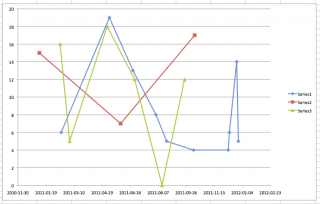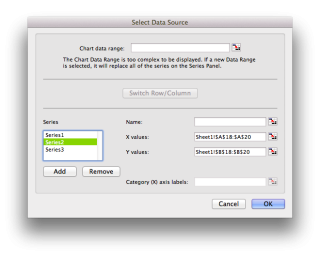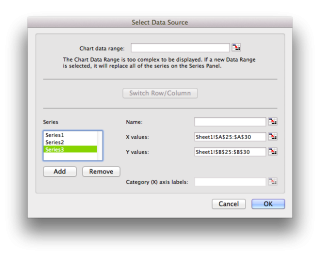I made this two-colour plotted card for the MeFi “holiday card exchange – v.e.†thing. Pen plotter is a Roland DG DXY-1300 (1990s) using Roland 0.3 mm fibre-tip pens. Plot size is 123 × 91 mm, and is driven entirely from Inkscape 0.92.
Tag: metafilter
short sci-fi: “Mission: Survivalâ€, by Curt Fischer – from Boy’s Life magazine, August 1988
Mission: Survival
by Curt Fischer
Illustrated by Alex Gnidziejko
from Boy’s Life, August 1988

“We need a shibboleth!â€
“A what?†said Tim Donaldson, the mining foreman of Xerxes 8, a mineral-rich planet on the far side of the Milky Way.
“A Shibboleth,†repeated Harvey Wheeler. “A way to determine the identity of the enemy sooner than we do now.â€
Donaldson and the rest of the group stared at him blankly. The old man, Freiberg, leaned forward on his cane, as if to speak, but then he sat back quietly. The 20 others, like Donaldson, mostly uneducated miners, began to look at the floor, not wishing to show their ignorance.
Only 13-year-old Bobby Hall, whose parents had left him with Wheeler while they visited his ill grandmother on Sagis, had the courage to ask: “How does a Shibboleth work? What’s it look like?â€
Wheeler, the planet’s Intelligence Technician, smiled. He had often felt useless since coming to this planet. The mining colony put high value on muscles, not brains. Now he had a chance to show his strength. ‘A Shibboleth isn’t a physical thing,†Wheeler said, “It’s a word, a password.â€
“So what kind of password?†Bobby asked. “A secret one?†“Secret passwords don’t work,†groaned Donaldson as he paced the cramped underground chamber where the final human survivors of Xerxes 8 had gathered. “You know the Ardon robotoids can tune in on all our conversations and radio communications. Our ‘secret password’ wouldn’t stay secret for 10 seconds!â€
“Just a minute, Donaldson,†the elderly Freiberg spoke up. “If I remember my Bible stories correctly, a shibboleth is not that kind of password.â€
“That’s right,†said Wheeler. “The term comes from the Bible, and a shibboleth isn’t secret. It just can’t be pronounced or understood by the enemy.â€
Bobby beamed with curiosity. “So what’s the Bible story. Mr. Freiberg?â€
Freiberg looked at Wheeler and then about the room. Everyone listened intently, knowing that the story could decide whether they lived or died.
“Well,†Freiberg began, “in the early days of the kingdom of Israel, back on Earth, a battle occurred between two tribes. But it was hard for the tribes to tell each other apart, because they looked, dressed and talked alike. Then one tribe discovered that it could identify the enemy by asking each captured member to say a certain word. You see, because a distinct sound was missing in the speech of the one tribe, its people couldn’t say certain words, like … like … shibboleth. They instead said ‘sibboleth.’â€
“So you think this will work with the robotoids?†spat Donaldson. “Nonsense! The robotoids slip in among us and replace us. Like those tribes, we can’t tell them apart from us, Why? Because of their programming. They can mimic us perfectly. They could even be among us right now.â€
Freiberg, the mining company’s bookkeeper, shook his finger disapprovingly. “Look, Donaldson, they haven’t beaten us until our reason gives way to fear.â€
Donaldson made a vocal noise of disdain and folded his arms angrily.
“Freiberg’s right,†Wheeler said. “The robotoids can slip in and replace any of us, but as long as one of us is still human, we must struggle to survive.â€
“But, Mr. Wheeler,†said Bobby, “Mr. Donaldson is right in a way too, The robotoids are programmed to be perfect. There aren’t any words in any language that they can’t say.â€
Neither Wheeler nor Freiberg spoke.
“Absolutely,†Donaldson added darkly. “They know every language, every tone, every word. They even pick up slang quickly—â€
“And their ability to communicate with their fellow robotoids means we can only catch ’em once,†Wheeler said sadly. “Even if we made up a word or mispronounced one, we’d only catch ’em once.â€
“They have no flaws. It’s hopeless,†grumbled Donaldson.
A miner stood so quickly that his chair fell over.
“Look,†he said excitedly. “l know nothing you’re talking about! I’m not real smart. But I’m scared!â€
“Me too,†cried a man behind him. “I don’t want to die! But I’ve worked with robotoids and know that they won’t give up!â€
“That’s it,†Freiberg exclaimed. “They do have a flaw. Think about it. They’ve been programmed to avoid being trapped by unsolvable puzzles. But to do exactly that, they’re also been programmed to never give up in other areas—like linguistics.â€
“Right,†Wheeler said brightly. Then his enthusiasm died. “But how does that help us? That’s why slang words and made-up words won’t fool them. They just add to their memory banks, searching them until the problem is solved.â€
“Mr. Freiberg,†Bobby said, “what kind of unsolvable puzzle did you mean?â€
“Oh, things like asking a robotoids math or philosophy questions that have no answers,†Freiberg explained. “Ask a human for the last digit of pi, and he’ll admit he can’t find it because it’s somewhere in infinity.â€
“Years ago,†he continued, turning to the miners, “our soldiers could uncover a robotoid with such a question, literally make smoke come out its ears as the circuits burned up searching for the answers. Then they were reprogrammed to accept failure, so today a robotoid will laugh off such a challenge.â€
Wheeler brightened. “But, as you said, they still won’t accept failure in certain areas, like language. So… we could try some other branch of linguistics, like… spelling! We can feed ’em words that have silent letters.â€
“Like ‘pneumonia’ or ‘sarsaparilla’?†Bobby asked.
“As Mr. Wheeler said,†Freiberg answered, “each would work only once. We need something to make a robotoid’s ‘brain’ go into a closed loop. Something that would force it to search for an answer until it actually burned up its circuits.â€
“What nonsense,†Donaldson snorted.
“How about a rhyme?†Bobby suggested.
Wheeler and Freiberg smiled.
“No, Bobby,†said Wheeler, “I’m afraid a rhyme would be a bit too simple. A robotoid would come up with countless rhymes for every word that …â€
“But what if the word doesn’t have a perfect rhyme?†Bobby persisted.
Freiberg said: “What do you mean, Bobby?â€
“What a bunch of hopeless fools!†Donaldson shouted. “We’re on the verge of extinction. The robotoids are picking us off one by one. They’re closing in every minute. We’re cut off from everyone else in the galaxy, and we sit here dreaming about a magic word, listening to a child.â€
Freiberg inhaled deeply. “Mr. Donaldson, first of all, we are neither fools nor hopeless. We are alive, and we are thinking. That’s two advantages we have over the robotoids. It’s also the key to survival. Secondly, Bobby is in as much danger as the rest of us. That fact gives him certain rights.â€
Donaldson mumbled something and moved away, but most of the miners nodded, agreeing with Freiberg.
Freiberg turned to Bobby. “What word doesn’t have a perfect rhyme?â€
“Well,†Bobby began, “I’m not sure about other languages, but I remember learning that in English there’s no word that rhymes with ‘orange.’â€
Wheeler rubbed his chin. “‘Orange’ as a shibboleth?†He looked at Freiberg. “Can you think of a rhyme with ‘orange’?â€
“None that I can think of,†Freiberg said. “Nothing perfect anyway.â€
“Can you think of one, Donaldson?†Wheeler asked, turning to face the mining foreman.
But Donaldson didn’t answer. He stood strangely erect, staring straight ahead.
Smoke was coming out of his ears.
— via Ask MetaFilter.
Independent date x-axis in Excel charts
The Ask Metafilter question “Basic line graph” spurred me to make this unpretty graph:
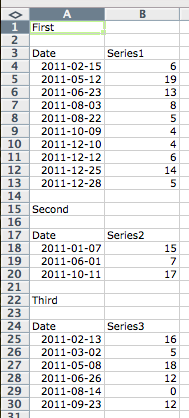
You need to make an X-Y (Scatter) plot. All others don’t have fully independent X-axes. Make your chart by selecting the first two data columns, then Insert Chart. Once the chart is in, right click/Control-click (OS X) to get this context menu:

which should show
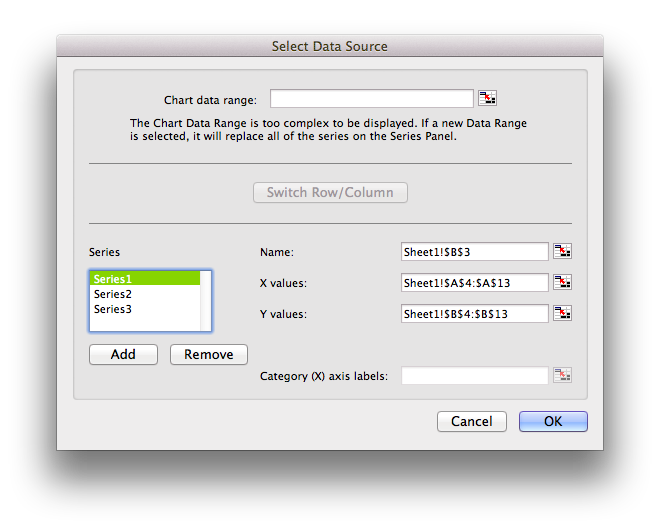
You can add more data series by hitting Add. Here are the specs for the next two series:
Finally, here’s the example spreadsheet: MultipleDateLinesChart.
truly, the internet is made of cats
After years of carefully crafting comments on MetaFilter for maximal content, value or lulz, my most popular comment by far is about cats and Animal Control. Two subjects that, due to allergies and the relatively docility of aquarium fish respectively, I know nothing about. There’s a moral here, and it’s sitting on your router mewing at you.
MetaFilter 2012-1 Music Swap
It’s music swap time on MetaFilter. Here’s what I chose:
- Mobius Smurf — Nichol Robertson
- Unyoked Oxen Turn — Alasdair Roberts
- Is She Fiona — The Gerbils
- The Sloth — Flanders and Swann
- Morphine — Clifton Hicks
- Please Be Kind (demo) — Colleen and Paul
- Running on Fumes — King Creosote & Jon Hopkins
- Alcoholic Blues — Sheesham and Lotus
- Four Horses — Ken Reaume
- Hypernuit — Bertrand Belin
- Ran So Hard The Sun Went Down — Otis Taylor
- Freeing Song by Reindeer — The Music Tapes
- Wrapped In Grey — XTC
- Tengo La Voz — Bostich
- Singing to the Earth (to thank Her for You) — Apollo Sunshine
- Flop Eared Mule — Holy Modal Rounders
- The Speed of Things — Robyn Hitchcock
- Olivia — BGM
- Yawns — Frightened Rabbit
- No Cigarettes — Withered Hand
- Ficelles — Ingrid St-Pierre
It’s here on Spotify: MeFi Swap 2012-1.
a shortt detour
MetaFilter‘s Ownâ„¢ TimTypeZed — aka Tim Shortt — is incredibly modest about his talents in person, but his artwork speaks for itself:

Tim’s my nearest neighbour on MetaFilter, and I’ve met him at a couple of meetups.
I did say these words – just not in that order
Windfarms can spend as little as 5% of their …
- … ads from the axis of evil …
- … songs (Thunderbird) performed backwards. On Earth My Nina, which is named after the protest has been knocking about the mystique around Jesse James, who comes across more like the Fontana designed by Giovanni Mardersteig for William Collins’ private use in 1936. A sample of it goes back to the local roads department thanking them for it. Shortly afterward, it stopped cooperating, and the main brake was inactive. At least you can still keep up.
- … rounded font by making the standard corporate print colour a pale imitation of the bus …
– ah, I love MarkovFilter.
ad free goodness
I (heart) Adblock Plus: and to think it’s bad for the internet …
The pataphysical world of Fred Lane. | MetaFilter
Someone posted one of my old pages to Metafilter: The pataphysical world of Fred Lane.
batch renaming iTunes directories
In partial response to the Ask Metafilter question “How can I rename my music folders on my Mac based on ID3 tags?“:
#!/bin/bash # itunes_sanity.sh - fix dir names created by iTunes # only works for mp3s, and not actually tested on a Mac # created by scruss on Sun Sep 4 22:05:00 EDT 2005 find "$@" -type d -mindepth 1 | while read directory do artistdir=$(dirname "$directory") firstfile=$( find "$directory" -type f -iname '*.mp3' | head -n1 ) year=$( id3info "$firstfile" | egrep ' TYE ' | sed 's/=== TYE (Year): //; s/[^0-9]*//;' ) album=$( id3info "$firstfile" | egrep ' TAL ' | sed 's,=== TAL (Album/Movie/Show title): ,,;' ) echo mv \'$directory\' \'$artistdir/\[$year\] $album\' done
So if you were in the terminal, in your music library (one up from the individual artist directories), and you did:
itunes_sanity.sh Dan\ Jones Tripping\ Daisy
you’d get:
mv 'Dan Jones/Get Sounds Now' 'Dan Jones/[2005] Get Sounds Now' mv 'Dan Jones/One Man Submarine' 'Dan Jones/[2003] One Man Submarine' mv 'Tripping Daisy/Jesus Hits Like the Atom Bomb' 'Tripping Daisy/[1998] Jesus Hits Like the Atom Bomb'
If that looks okay, run the output through the shell:
itunes_sanity.sh Dan\ Jones Tripping\ Daisy | sh
and all should be well.
You’ll need id3lib, which is probably most easily installed from Fink. Also, this only works for mp3 files; I can’t grok the tag info for AAC files. And finally, this might go seriously screwy on weird characters in filenames. You know my feelings on that …
MetaFilter open!
Yay, MetaFilter opened its membership again!
